A website without images will look plain, boring, and borderline unprofessional.
Think about it for a moment: When was the last time you visited a website that didn’t have any photos? If you actually encountered this rarity, you probably left the site fairly quickly for fear of spam, phishing, or malware. Simply put, barren sites without any visual content can appear shady and untrustworthy.
Not having images hurts your site, and having images helps. They’re appealing. Photos in your blog posts will break up the text and make it easier for people to read and scan through your content. Detailed product photos show prospective customers exactly what they are purchasing. The perfect position of a website image can help you design a homepage that converts.
Studies show that three days later people only remember 10% of the information they hear. When that information is paired with a relevant photo, 65% of it gets retained.
Bottom line: You should be using photos and other visual content on every single page of your website.
Sure, you might recognize the fact that you need website images. You might even have some that you want to use. But are you legally allowed to use them? Do you have to pay?
This is a common problem among website owners. They don’t know where to get images. So, they’re hesitant add visual content to their site for fear of copyright infringement or hefty legal fines. Not to worry.
In this guide, we’ve identified the top nine places to find images for your website. Some of these resources offer images that are completely free; others you’ll have to pay for.
Whether your website is new and still in the early stages of design and development, or established and in need of some fresh visual content, you’ll find what you’re looking for on this list.
1. Unsplash
Unsplash started as 10 free photos every week. They were leftovers from a photoshoot that would have otherwise died in a folder somewhere. Today, there are 792,198 images and every single one of them is free for commercial or noncommercial use. They’re generously uploaded by creators and all follow the same do-what-you-want license.
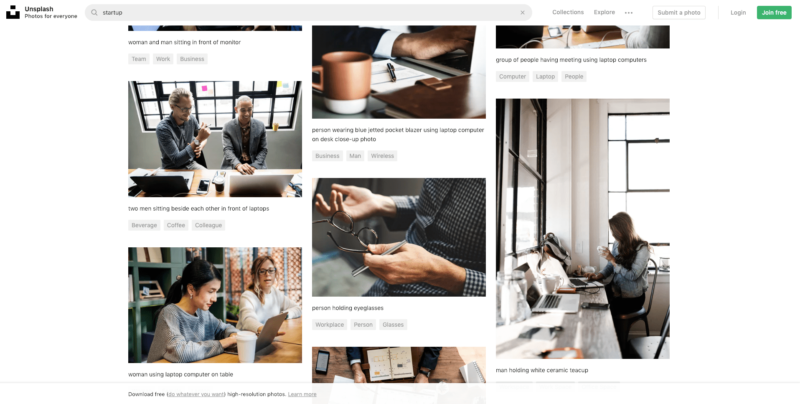
The most notable thing about Unsplash: the images are gorgeous. They’re well done and have a point-of-view, and every week they’re organized into easy-to-browse collections.
You don’t have to give credit if you use any photos from Unsplash as website images, but you can if you want. It’s as simple as adding a line like: Photo by Photographer on Unsplash
2. Pexels
There are 504,828 images uploaded in the Pexels library and every single one of them is free for commercial use without attribution. They all have the same super simple license.
The entire library is also available on the mobile app, which makes it even easier to find and upload images to your brand’s social media. (You can also search for images by keyword or emoji.)

They also feature photos from nappy, a stock library created by the influencer mgmt agency SHADE for black and brown creators, after they saw that sites like Unsplash and Pexels were fixing the corny stock image problem, but were still lacking in diversity.
3. Flickr
Flickr is a top option to consider for free website images. The platform encourages users to upload, share, edit, and organize their photos from any device.
Not everything hosted on here is free for commercial purposes. So double check the image rights for content before you add it to your company’s website. You can do this by searching for images with licenses that say “Commercial use allowed.” For most of these images, you can use them on your site as long as you include attribution in the form of a reference link back to where the image came from on Flickr. Every image will have a link to the license that’ll tell you the requirements in simple sentences.
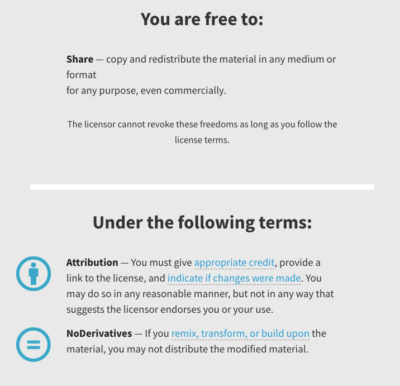
One of the best parts of Flickr is the trending tab.
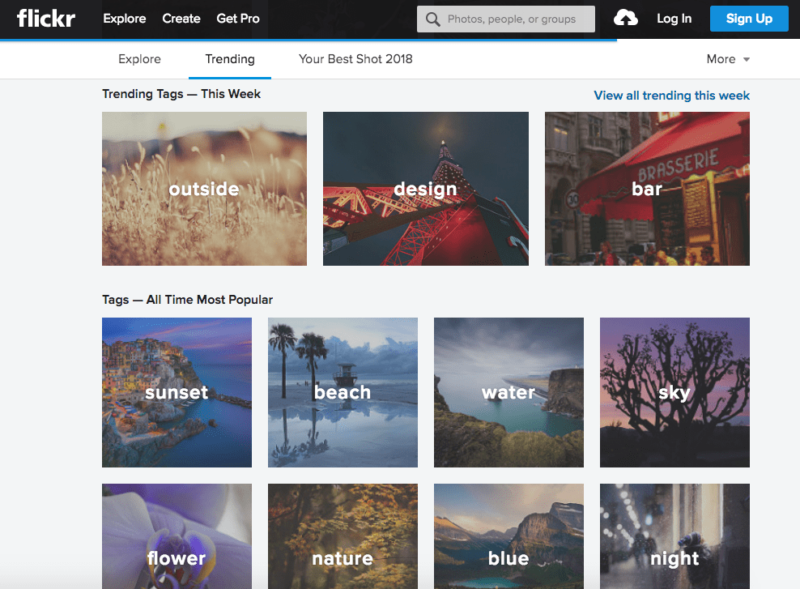
You’ll be able to see categories trending in real-time, trending weekly, as well as trending all-time. So you can go with images that are popular, or stay clear from them in an effort to be more unique. Either way, these options are great if you’re looking for common themes for your entire website.
4. iStock
iStock has millions of images available that are royalty free, so it’s one of the first places you should start your image search.
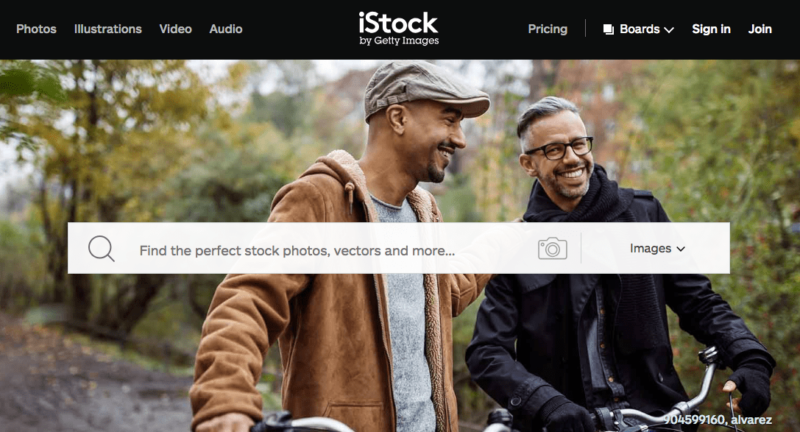
One of the parts about iStock is the way it’s organized. It’s easy to search for images in specific categories. If you see something you like, you can save it to your board and refer to it later.
There’s no way to download or search for free images on iStock, though they do send one free photo, illustration, and video each week if you sign up for their newsletter. They sell photos based on a credit system. The more credits you buy, the cheaper each one is:
- $12 for 1 credit ($12 each)
- $60 for 6 credits ($10 each)
- $325 for 36 credits ($9 each)
- $2,400 for 300 credits ($8 each)
iStock also offers subscription pricing as well, which gives you access to a specified number of images per month.
In addition to photos and stock images, iStock also offers illustrations, vectors, videos, and audio files as well. All of these can be used to improve your website.
5. Openphoto.net
The Open Photo sharing platform has been around for 20 years. Everyone contributing to this resource offers photos for free under the Creative Commons licensing. Like Flickr, it’s really easy to navigate and find what you’re looking for on Open Photo. They also keep track of trending photos and categories. You can see popular images from today, yesterday, and all-time.
Open Photo always highlights a photo of the day on its homepage and gives credit to the photographer who uploaded it. If you see a photo of the day that you really like, it’s a good idea to check out other images that were uploaded by that photographer.
Even if the content of the images isn’t always the same, photographers tend to have a certain style. So if you like the way someone approaches their photography, you may want to use images from them throughout your entire website.
6. Pixabay
Pixabay is another resource that offers images shared by members of its community. There are more than 1.6 million photos and videos offered royalty-free for commercial purposes. You don’t have to ask for credit or give credit to the artist.
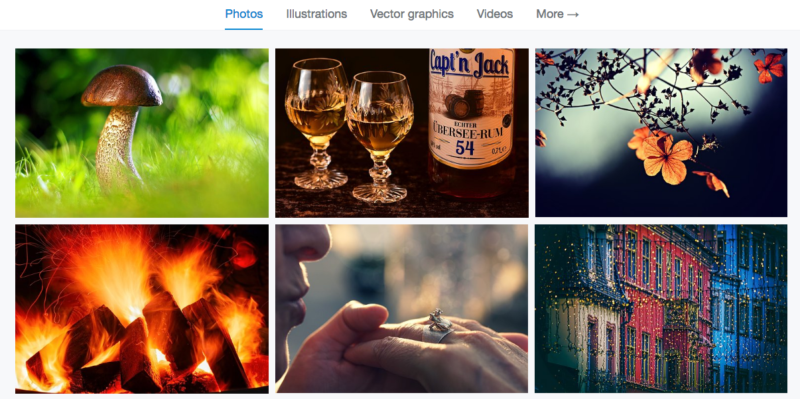
Pixabay has a powerful search with filters like:
- orientation
- size
- color
So if you’re looking for a blue, horizontal photo, that’s 4000 px X 3000 px, simply add those parameters to the search menu, and it’ll only display results that fit your needs. There’s also a safe search function as well that filters out any content that might be perceived as not safe for work.
Another reason why Pixabay is a top choice to consider is because they have a mobile app that’s available on both iOS and Android devices. Perfect for doing work on the go when it’s not convenient to take your computer out.
7. Rgbstock
There are over 100,000 free stock photos available from Rgbstock.com. You can find photos by searching for categories or keywords. They also let you browse photos from the collections of specific photographers that you like.
In order to access any of the content on this platform, you’ll need to register and create an account. But like everything else on here, it’s completely free. For those of you who want to share your own photos with the Rgbstock community, you can easily create your own photo gallery in just a few minutes.
8. Realistic Shots
Realistic Shots is a bit different from some of the other website image platforms we’ve looked at so far on our list. They don’t prioritize quantity. Only seven new photos are added to the site each week. But the quality of those seven photos is extremely high.
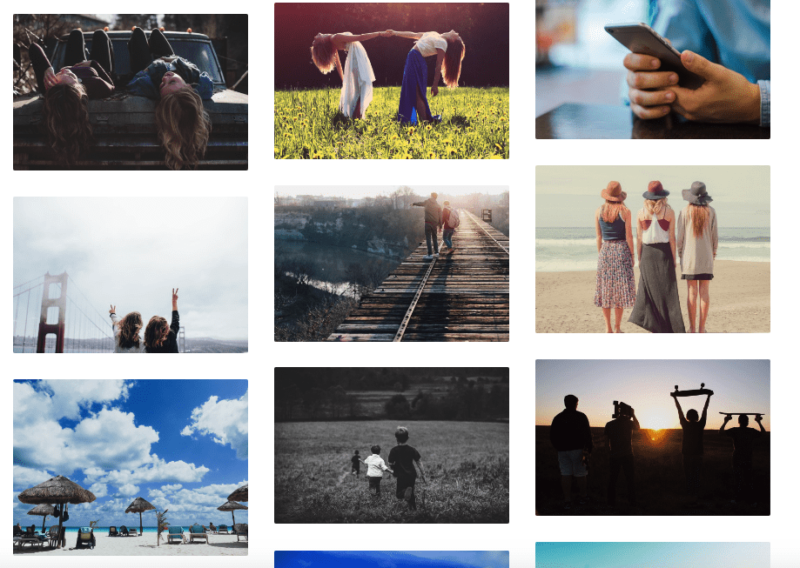
That’s pretty astonishing considering the fact that there are more than 1.8 billion images uploaded online every day. So to pick just seven each week means the quality needs to be superior in order to be featured. Realistic Shots puts emphasis on creativity for their most popular categories.
- nature
- travel
- architecture
- technology
- people
It’s worth coming to this site once a week to see the newest uploads. Everything hosted here is free for both personal and commercial use.
9. Fotolia
Fotolia is run by Adobe Stock. To access premium image content through this platform, you’ll need to pay. Similar to other options we’ve seen, you can buy credits or sign up for a subscription.
The great part about their subscriptions is that they have plenty of choices based on how often you’ll need stock images. Here is the monthly pricing for the annual memberships.
- 10 images for $29.99 per month
- 40 images for $79.99 per month
- 350 images for $169.99 per month
- 750 images for $199.99 per month
If you’re signing up for the first time, you can get one month free with any of these plans. They offer month-to-month pricing rates as well if you’re not ready for an annual commitment. To purchase one or two images, your best bet is to buy credits individually.
One of the standout features of this software is the ability to use photos you have on hand to search for images you’re looking for. Just drag and drop an image from an online resource or from your computer into the search bar to find similar content.
Look at the search results for the image of this puppy.
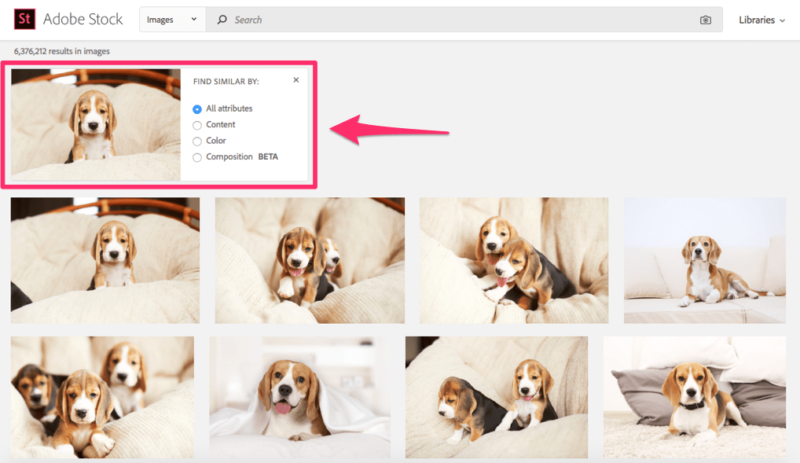
The software displays images that are similar and even from the same photoshoot. It’s a great tool that you can take advantage of.
Conclusion
Your site needs images. Visual elements will add credibility to your website, and make it more appealing for visitors.
There are thousands of places to find images online. But that’s overwhelming to stay the least. So start with the resources outlined on this list. It’s a mix of completely free sources, paid options, and some platforms that offer both free and paid images.
Otherwise, you can always use your own images. Refer to my guide on how to take and edit photos without hiring a professional if you want to add content that’s 100% unique and your own.
What types of images do you want to add to your website?
from Quick Sprout https://ift.tt/2RqjPWb
via IFTTT
No comments:
Post a Comment